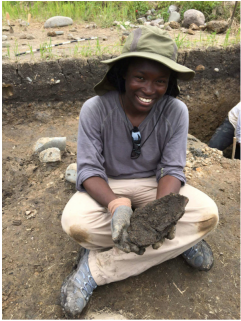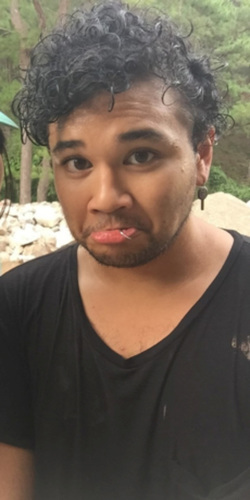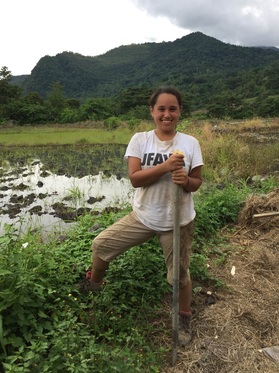
Tiffany Peacock I University of South Carolina I Anthropology & History Major
It is still hard to believe that I traveled to the Philippines this past summer. Being my first time outside of the United States, I never thought that an opportunity to study abroad would be possible. Quickly becoming one of the best times of my life thus far, I shared moments which created nostalgic memories with a cohort passionate about Anthropology that will never be forgotten.
Attending my very first field school, the Ifugao Archaeological Project became a place where I shared many firsts. First time flying out of the country, first time being so far away from home in South Carolina, first time visiting the Philippines, first time being in the mountains, and first time doing archaeological field work. One of the most memorable aspects was my first time experiencing the Ifugao culture and all it had to offer! From all the amazing food and the breath taking views, the cordillera highlands are very rich in beauty and filled with a story that can only begin to be understood by seeing the Ifugao province in person. I am still very honored to have been given this opportunity and I am also very thankful for meeting the volunteers of SitMo, Dr. Stephen B. Acabado, Dr. Adam Lauer, all the helpful graduate students, and the various locals who visited headquarters for allowing us to learn more about them and what makes the Ifugao special as an ethno-historic people.
“There is no Me time, there is We time!” This statement was very comical and ironic because it spoke the truth about being a part of an archaeological field school. Spending a lot of time with my peers allowed for building new and better life skills when working and living together during the project. Also, I learned how to actively work and conduct research in a collaborative way that I will be able to apply in future research projects to come! Overall, being in the Philippines changed me as a person in that I do not take anything for granted and that ultimately the small things in life do not matter. Only the pivotal moments which will define my character are also the same moments which will propel my motivation to be successful and ultimately proud of all of the achievements that I strive to gain!
Conducting excavation fieldwork was very rewarding but it also required a lot of hard work! Waking up at 5am to start work days was difficult in the beginning but became second nature towards the end. With the encouragement of our field leaders and our field crews, the heat from the sun was not as bad while we all pushed to continue digging each and every day. With the help of Rihanna’s “Work, work, work, work, work, work, work…” excavating was even more enjoyable because of us all doing archaeology because we love it. The greatest memory about being in the Ifugao Archaeological Field School was how well everyone got along and the friendships that I have made will definitely last a lifetime.
It is still hard to believe that I traveled to the Philippines this past summer. Being my first time outside of the United States, I never thought that an opportunity to study abroad would be possible. Quickly becoming one of the best times of my life thus far, I shared moments which created nostalgic memories with a cohort passionate about Anthropology that will never be forgotten.
Attending my very first field school, the Ifugao Archaeological Project became a place where I shared many firsts. First time flying out of the country, first time being so far away from home in South Carolina, first time visiting the Philippines, first time being in the mountains, and first time doing archaeological field work. One of the most memorable aspects was my first time experiencing the Ifugao culture and all it had to offer! From all the amazing food and the breath taking views, the cordillera highlands are very rich in beauty and filled with a story that can only begin to be understood by seeing the Ifugao province in person. I am still very honored to have been given this opportunity and I am also very thankful for meeting the volunteers of SitMo, Dr. Stephen B. Acabado, Dr. Adam Lauer, all the helpful graduate students, and the various locals who visited headquarters for allowing us to learn more about them and what makes the Ifugao special as an ethno-historic people.
“There is no Me time, there is We time!” This statement was very comical and ironic because it spoke the truth about being a part of an archaeological field school. Spending a lot of time with my peers allowed for building new and better life skills when working and living together during the project. Also, I learned how to actively work and conduct research in a collaborative way that I will be able to apply in future research projects to come! Overall, being in the Philippines changed me as a person in that I do not take anything for granted and that ultimately the small things in life do not matter. Only the pivotal moments which will define my character are also the same moments which will propel my motivation to be successful and ultimately proud of all of the achievements that I strive to gain!
Conducting excavation fieldwork was very rewarding but it also required a lot of hard work! Waking up at 5am to start work days was difficult in the beginning but became second nature towards the end. With the encouragement of our field leaders and our field crews, the heat from the sun was not as bad while we all pushed to continue digging each and every day. With the help of Rihanna’s “Work, work, work, work, work, work, work…” excavating was even more enjoyable because of us all doing archaeology because we love it. The greatest memory about being in the Ifugao Archaeological Field School was how well everyone got along and the friendships that I have made will definitely last a lifetime.


 RSS Feed
RSS Feed
